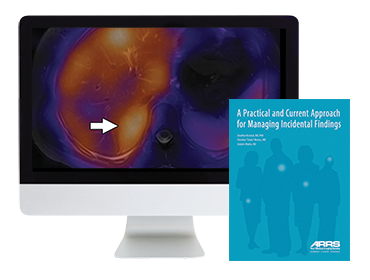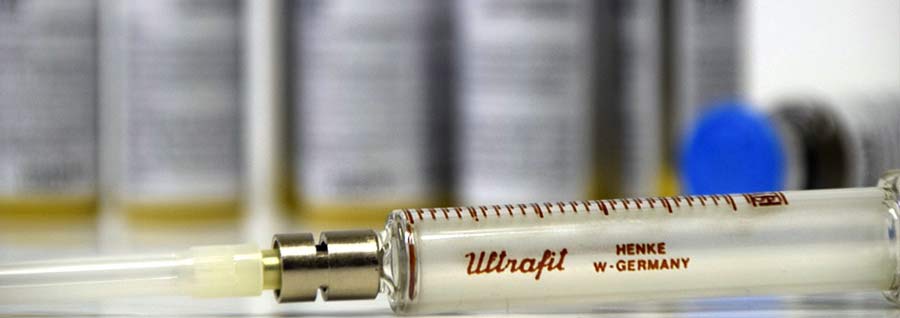Event Organized by:
American Roentgen Ray Society
(866) 940-2777
Learn More about American Roentgen Ray Society
Health care reforms are having many major impacts on both the practice and the economics of medical imaging. Central to this issue is the need to transform from the pay-for-service to a value-added paradigm. Managing incidental, likely asymptomatic, imaging findings remains a relevant theme, driving metrics for efficiency and appropriateness. This Online Course identifies and addresses the wide spectrum of incidental findings that occur via contemporary, evidence-based approaches to help standardize how they should be managed. In addition to 10 modules of online lectures, you will also receive the accompanying book—shipped to you at no extra cost.
Earn credit at your own pace with unlimited access to this course through June 22, 2023 and continue to access your videos until June 23, 2027. See learning outcomes and individual lectures below.

This course package offers 30 CME and SA-CME Credits following completion of an online assessment.
ARRS Member price: $795
ARRS In-Training Member price: $399
Nonmember price: $1,599
Or purchase the stand-alone book.
After attending this course, the attendee will be able to:
The American Roentgen Ray Society (ARRS) is accredited by the Accreditation Council for Continuing Medical Education (ACCME) to provide continuing medical education activities for physicians.
The ARRS designates this enduring material for a maximum of 30 AMA PRA Category 1 Credit(s)™ and 30 American Board of Radiology, MOC Part II, Self-Assessment CME (SA-CME) credits. Physicians should claim only the credit commensurate with the extent of their participation in the activity.
View the ARRS Return Policy.
The ARRS Online Categorical Course is an Accredited Self- Assessment Program (Section 3) as defined by the NEW Maintenance of Certification program (MOC) of the Royal College of Physicians and Surgeons of Canada (RCPSC), and has been approved by the Canadian Association of Radiologists (CAR) for a maximum of 2 credit hours per module.
The RCPSC recording system (MAINPORT) will automatically convert the credit hours for this program to three credits per claimed hour (2 hours x 3 = 6 credit hours).
Physicians should only claim credits commensurate with the extent of their participation in the activity.
Accreditation services do not imply endorsement of opinions presented during this activity.
Event Organized by:
American Roentgen Ray Society
Date: Jun 23 2027
Venue: Online Course
Address: - Online Course, web
| Date | Course/Event - Venue - Date |
|---|---|
| Jun 23 2027 | Online Course, web - Jun 23 2027 - Managing Incidental Findings A Practical and Current Approach |

The well being and aesthetics industry is growing rapidly which means selecting right training is more important than ever. Botox training courses must keep pace with the standards and regulations in the industry to ensure patient safety. In the anti-aging market the injectable serum, Botulinum Toxin more commonly known as Botox, has become one of the top procedures for the effective treatment of fine lines and wrinkles. Once the preserve of the rich and famous, this wonder-treatment now has a long track record of success and safety making it a highly desirable procedure for a more youthful and healthy appearance.
If you are considering becoming a Botox clinician you will want the best Botox training available today, training that gives you a full understanding of the product and how to administer it safely with outstanding results for your clients every time. Aesthetic Education, promotes Botox Courses that are at the leading edge of training in aesthetics procedures with the best qualification for doctors, nurses and dentists, courses that are superior in meeting the guidelines which all practitioners must adhere to. The depth of learning and hands-on practice will equip you and your teams with the knowledge and experience you need to be fully regulated and confident to deliver safe and outstanding services at your practice.

North America
Boston, MA - New York, NY - Los Angeles, CA - Atlanta, GA - Las Vegas, NV - Dallas, TX - Detroit, MI - Chicago, IL - Houston, TX - Orlando, FL - Philadelphia, PA - Naples, FL - Tampa, FL - Charleston, SC - Jacksonville, FL - Canada - Fort Lauderdale, FL - Omaha, NE - Baltimore, MD - Washington, DC - New Orleans, LA - Miami, FL - Indianapolis, IN - Seattle, WA - Charleston, SC - Jackson, MS - San Francisco, CA - Fort Myers, FL - Des Moines, IA - Denver, CO - San Antonio, TX - Kansas City, MO - Portland, OR - Atlanta, GA - Austin, TX - Columbus, OH - Minneapolis, MN - Albuquerque, NM - Louisville, KY - Buffalo, NY - Raleigh, NC - Pittsburgh, PA - Little Rock, AR - Seattle, WA - St. Louis, MO - New York, NY - Los Angeles, CA -Central America
Mexico - Honduras - Nicaragua - El Salvador - Panama - Belize - Costa Rica - GuatemalaCaribbean
Haiti - Puerto Rico - Islas Virgenes - Republica Dominicana - Jamaica - Cuba - Bahamas - Trinidad y Tobago - Barbados - CanadaEurope
Dubai - Paris SpainBotox Training and Dermal Fillers for Argentina, Bolivia, Brasil, Chile, Colombia, Costa Rica, Cuba, Dominica, Republica Dominicana, Ecuador, El Salvador, Guatemala, Haiti, Honduras, Mexico, Nicaragua, Panama, Paraguay, Peru, Puerto Rico, Uruguay, Venezuela.
MD.Education | The Next Step in Medical Learning
MD Courses
Pain Management Courses
Medical Courses
Copyright 2025 MD.Education - All rights reserved. - Botox® is a registered trademark of Allergan, Inc.